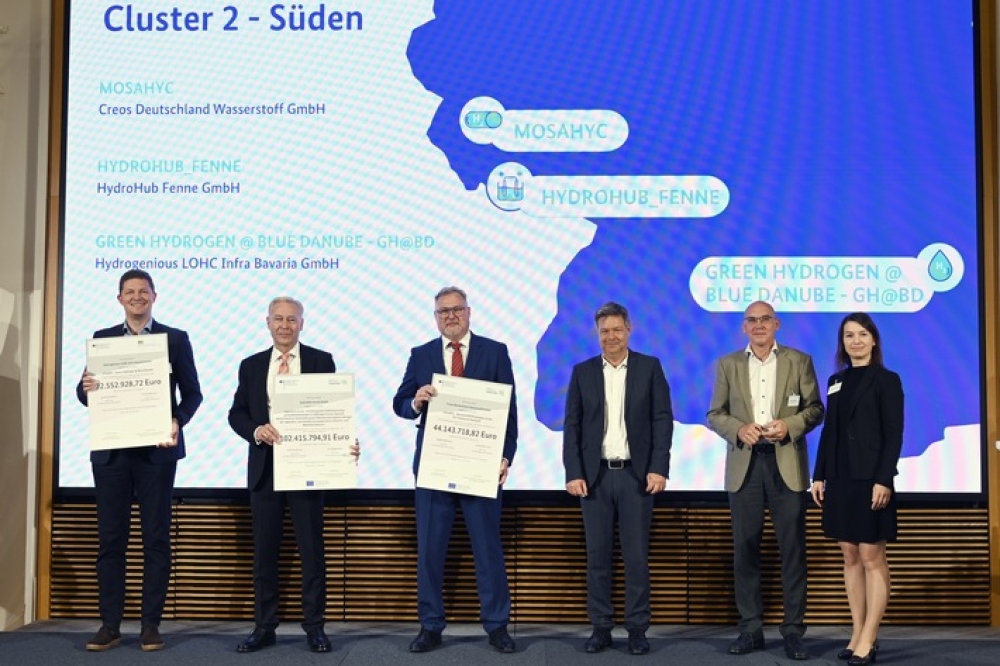IPCEI: Hydrogenious LOHC receives multi-million grant for Green Hydrogen @ Blue Danube

German Federal Minister for Economic Affairs and Climate Action Dr Robert Habeck and Dr Markus Wittmann, Ministerial Director of the Bavarian Ministry of Economic Affairs, Regional Development and Energy personally handed over the 72,5 million Euro grant notification.
German Federal Minister of Economics Dr Robert Habeck and Dr Markus Wittmann, Ministerial Director of the Bavarian Ministry of Economic Affairs, Regional Development and Energy have officially handed over the grant notification of 72,5 million Euro to Hydrogenious LOHC Infra Bavaria, a subsidiary of Hydrogenious LOHC Technologies, for the Green Hydrogen @ Blue Danube project. The federal government is providing 70% of the funding, while the state of Bavaria contributes 30%. This project has already been notified by the European Commission in February 2024 as an "Important Project of Common European Interest" (IPCEI) in the hydrogen "Hy2Infra" wave. It contributes to a sustainable and stable hydrogen supply for industry in Central Europe.
Starting in 2028, the LOHC ReleasePLANT to be built as part of the Green Hydrogen @ Blue Danube project will supply up to 1,800 tons of green hydrogen to offtakers in the Bavarian industrial area in the Danube region. Thanks to the innovative “Liquid Organic Hydrogen Carrier” (LOHC) technology by Hydrogenious, these industrially relevant quantities of green hydrogen can be transported to Southern Germany by leveraging the already existing liquid fuel infrastructure. In addition to being available to supply local industrial offtakers, the hydrogen can also be injected into pipeline networks such as HyPipe Bavaria. This network can be further expanded through planned pipeline connections to the German Hydrogen Core Network and the European Hydrogen Backbone, increasing the resilience of the energy system.
Hydrogenious' LOHC technology allows hydrogen to be safely bonded to the hardly flammable thermal oil benzyltoluene in a chemical process called hydrogenation. This oil can be transported using conventional infrastructure such as trucks, trains, barges and tankers with no loss of hydrogen, providing a very safe and easy way to transport large quantities of hydrogen to the hinterland, especially when compared to other transportation technologies. At its destination, the hydrogen is released from the oil in a chemical dehydrogenation process and is available in high purity for industrial applications, power generation or the mobility sector. The carrier oil is not consumed in the process and can be reused for new hydrogen storage and transportation.
Dr Robert Habeck, Federal Minister for Economic Affairs and Climate Action “The energy transition remains one of the biggest challenges for our country, even in the face of further crises and conflicts. By promoting hydrogen projects, we are taking an important step towards a climate-neutral and sustainable economy in Europe and beyond. We are giving the go-ahead for the construction of electrolysers in the three-digit megawatt class, thereby enabling important progress to be made in the domestic production of green hydrogen. An efficient hydrogen infrastructure plays a key role in enabling the decarbonization of industry and the energy sector. Hydrogen pipelines will be the lifelines of industrial centers. This will create the conditions for climate-neutral growth.”
Hubert Aiwanger, Bavarian Minister of Economic Affairs, Regional Development and Energy “Today marks an important milestone in the development of an efficient and diversified hydrogen infrastructure for Europe, Germany and Bavaria. With today's handover of the funding grant to Hydrogenious for the hydrogen IPCEI project "Green Hydrogen @ Blue Danube", Bavaria and the federal government are providing an important impulse for global hydrogen supply chains. I am delighted that Bavaria is and will remain a home for innovative solutions in the field of hydrogen.”
Dr Daniel Teichmann, CEO and founder of Hydrogenious LOHC Technologies “We would like to thank the German Federal Ministry for Economic Affairs and Climate Protection and the Bavarian Ministry for Economic Affairs, Regional Development and Energy for their trust and support. The projects notified by the EU as IPCEI are essential for the timely ramp-up of the European hydrogen economy and we are proud to be part of it. By building up the world's largest LOHC-based hydrogen supply infrastructure we contribute to the achievement of Germany’s ambitious goals to accelerate the energy transition and decarbonize industry by 2030.”
































